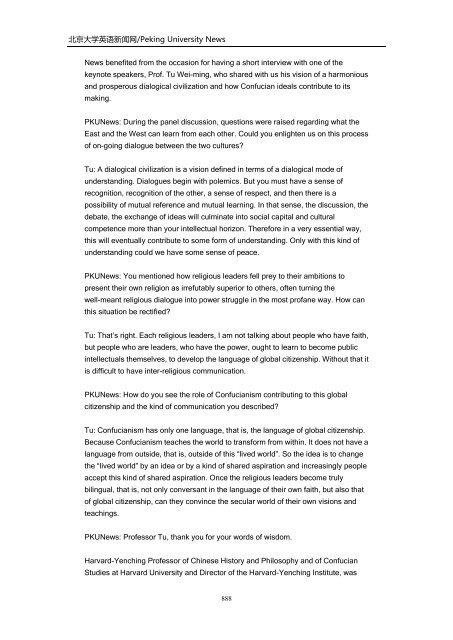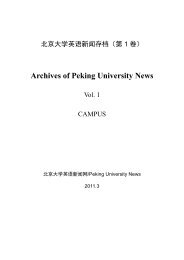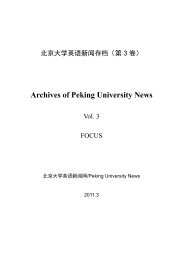Archives of Peking University News - PKU English - 北京大学
Archives of Peking University News - PKU English - 北京大学
Archives of Peking University News - PKU English - 北京大学
Create successful ePaper yourself
Turn your PDF publications into a flip-book with our unique Google optimized e-Paper software.
<strong>北京大学</strong>英语新闻网/<strong>Peking</strong> <strong>University</strong> <strong>News</strong><br />
<strong>News</strong> benefited from the occasion for having a short interview with one <strong>of</strong> the<br />
keynote speakers, Pr<strong>of</strong>. Tu Wei-ming, who shared with us his vision <strong>of</strong> a harmonious<br />
and prosperous dialogical civilization and how Confucian ideals contribute to its<br />
making.<br />
<strong>PKU</strong><strong>News</strong>: During the panel discussion, questions were raised regarding what the<br />
East and the West can learn from each other. Could you enlighten us on this process<br />
<strong>of</strong> on-going dialogue between the two cultures?<br />
Tu: A dialogical civilization is a vision defined in terms <strong>of</strong> a dialogical mode <strong>of</strong><br />
understanding. Dialogues begin with polemics. But you must have a sense <strong>of</strong><br />
recognition, recognition <strong>of</strong> the other, a sense <strong>of</strong> respect, and then there is a<br />
possibility <strong>of</strong> mutual reference and mutual learning. In that sense, the discussion, the<br />
debate, the exchange <strong>of</strong> ideas will culminate into social capital and cultural<br />
competence more than your intellectual horizon. Therefore in a very essential way,<br />
this will eventually contribute to some form <strong>of</strong> understanding. Only with this kind <strong>of</strong><br />
understanding could we have some sense <strong>of</strong> peace.<br />
<strong>PKU</strong><strong>News</strong>: You mentioned how religious leaders fell prey to their ambitions to<br />
present their own religion as irrefutably superior to others, <strong>of</strong>ten turning the<br />
well-meant religious dialogue into power struggle in the most pr<strong>of</strong>ane way. How can<br />
this situation be rectified?<br />
Tu: That‘s right. Each religious leaders, I am not talking about people who have faith,<br />
but people who are leaders, who have the power, ought to learn to become public<br />
intellectuals themselves, to develop the language <strong>of</strong> global citizenship. Without that it<br />
is difficult to have inter-religious communication.<br />
<strong>PKU</strong><strong>News</strong>: How do you see the role <strong>of</strong> Confucianism contributing to this global<br />
citizenship and the kind <strong>of</strong> communication you described?<br />
Tu: Confucianism has only one language, that is, the language <strong>of</strong> global citizenship.<br />
Because Confucianism teaches the world to transform from within. It does not have a<br />
language from outside, that is, outside <strong>of</strong> this ―lived world‖. So the idea is to change<br />
the ―lived world‖ by an idea or by a kind <strong>of</strong> shared aspiration and increasingly people<br />
accept this kind <strong>of</strong> shared aspiration. Once the religious leaders become truly<br />
bilingual, that is, not only conversant in the language <strong>of</strong> their own faith, but also that<br />
<strong>of</strong> global citizenship, can they convince the secular world <strong>of</strong> their own visions and<br />
teachings.<br />
<strong>PKU</strong><strong>News</strong>: Pr<strong>of</strong>essor Tu, thank you for your words <strong>of</strong> wisdom.<br />
Harvard-Yenching Pr<strong>of</strong>essor <strong>of</strong> Chinese History and Philosophy and <strong>of</strong> Confucian<br />
Studies at Harvard <strong>University</strong> and Director <strong>of</strong> the Harvard-Yenching Institute, was<br />
888




